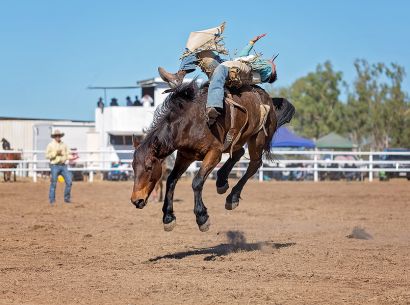This Week's Story
People are on a wild confusing ride with the English language.

This Week’s Story relives American history and the Bible through brief inspiring stories presented on mp3 audio recordings and text for reading.
English, the Bucking Bronco
Imagine you are riding a bronco named English. Your twisting ride lasts four seconds. Then you fly into the air, crash to the ground, and English disappears.
How did he escape without eyes following him? Could his escape be measured in nanoseconds?
People today living in one country are often on a wild confusing ride with the English language. Talking and communicating are not happening at the same time. People who supposedly speak the same language, find that words coming out of their mouths or appearing on phone texts are unfamiliar to people expected to answer them.
The problem is accelerating. Long ago I was jarred with this problem, when I was to meet a daughter.
No Uber, Lyft, or GPS was available. My daughter had travelled by train, then switched to a bus. I was to find her at the end of a bus line.
No one gave me directions. I stopped at several gas stations. No attendant spoke English.
I called a taxi company and ordered a taxi to drive ahead of me. We arrived in an industrial area, almost under an overpass and by railroad tracks. There were no helpful signs.
The bus left and we had not found my daughter. We waited. Then I heard a voice calling, “Mother, Mother.” Far in the distance was Susan on the overpass pushing a stroller with my little granddaughter.
Later I thought what an idiotic dilemma for two teachers to be in, especially in the country in which they were born.
We are living in an era of enormous language changes. It is impractical to escape. More accommodations with international signs and PATIENCE are essential.
In our multicultural and multi-language settings we struggle to communicate because the English language is losing standard forms. Not enough language is shared.
Using the English language irritates our everyday survival. How do we spell English words on cell phones, notes, and signs? Is there standard spelling of basic words?
What words do we use with people or groups we do not know, but who are English speakers? Many groups have their special jargon.
How do we read material when its fonts are unrecognizable or it uses cursive writing, which is taught in some schools and not in other schools? Is there a need to know basic grammar, or is it unimportant?
Do we pronounce English words as they are said in their country of origin? How do we define them, especially if they are technological or foreign?
The English language is exploding too rapidly on too many fronts for a computer to track precisely. How can it be organized? Do we have an English language?
Would it be fair to bring more order into the English language? In 1755 Samuel Johnson faced a spelling nightmare and attempted to standardize English spelling. He published the Dictionary of the English Language.
Perhaps the English language needs pioneers to suggest categories and standards for basic usage and communication.
This is Barbara Steiner with you and the English language.
Share your suggestions at the website thisweeksstory.com. At the story’s end click the words Let’s Talk.
<< previous story] [next story >>
We invite your comments! [click here to comment]
From Frank
The Spanish and English languages are being changed, through music and other languages. Why just a few years back i had never heard terms like lol, and laugh out loud.
Response by Elizabeth at This Week's Story
With all the changes in languages, and the world, what will never change, is the one holding that world.
This Week's Story is a non-profit supported by listeners. [click here to make a donation]
 click here to play audio
click here to play audio